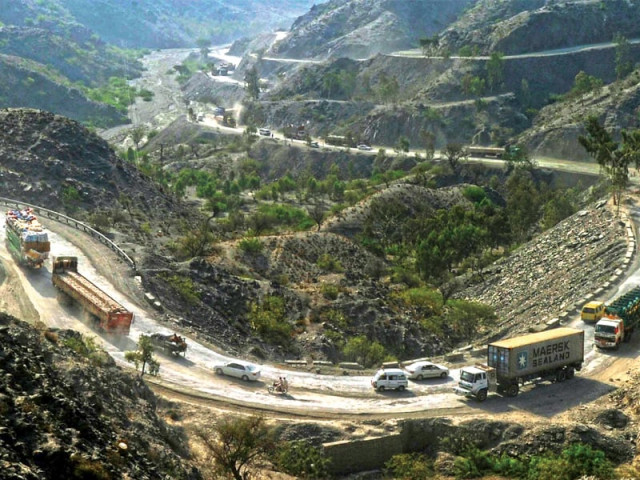A taxing affair: Levy suggested for imports in tribal belt
Recommendation made to streamline trade with Afghanistan

Recommendation made to streamline trade with Afghanistan. PHOTO: FILE
As the tribal region is largely underdeveloped, it is exempt from income tax. However, federal excise duty is applicable in Fata and customs duty is collected at the Torkham customs station. The bulk of imports are to Afghanistan under APTTA, officials told The Express Tribune,
As a result, the main source of revenue is customs duty. An amount of Rs179.1 million was collected under this head during FY 2013-14, mainly from customs duty. Federal excise duty contributed Rs2.8 billion during the same period.
As per the 18th Constitutional Amendment, taxation of services has been transferred to provinces. Sindh, Punjab and Khyber-Pakhtunkhwa started collecting from various services. The share of FATA in the telecommunication sector is to be determined, they said.
Documents available with The Express Tribune show that Section 1 of the Sales Tax Act, 1990 has not been extended to the tribal areas as yet. The benefits of non-application are restricted and confined only to production in Fata and Pata and consequent sales and consumption of the same region.
The registered persons in Pakistan, making taxable supplies, (other than the zero rated exports) have to charge sales tax even on supplies to Fata and Pata and issue invoices accordingly to the person on the receiving end.
A significant amount of international trade is being carried out at Torkham. The total volume of import and export is 0.62% and 0.11% of total trade on a national level, respectively.
Pakistan has recently signed the Transports Internationaux Routiers (TIR) convention with the international community and it provides a legal framework for traffic-in-transit of goods across borders among contracting parties. TIR will facilitate trade with ECO countries and China through land routes. It will also help access by land/sea through Pakistan from/to China, Central Asian states and beyond, thus opening a vertical corridor that will benefit regional and global trade and economies.
Pakistan has also become a member of Central Asian Regional Economic Coordination (CAREC). With the onset of these international agreements for trade development, the Torkham route has become more important. Safe and speedy transportation of goods to Afghanistan and CAR is linked with the infrastructural development of Fata and peace in the region. “The government of Pakistan needs to provide more resources for Fata development to gain an advantage from these agreements,” the recommendations state.
Imports of around Rs.25 billion come in annually at the Torkham border. Initially, a 5% levy on imports at Torkham border should be imposed, is the recommendation. Depending on the flow of imports, more than Rs1 billion will be collected and the amount can be utilised for the education and health sectors.
The recommendations have been sent to the Ministry of State and Frontier Regions (Safron), the official said. Another senior officer from the ministry said the recommendation was part of a larger scheme of trade through the tribal areas and was still under consideration. A final decision has not been made as yet, he maintained.
Published in The Express Tribune, August 11th, 2016.



















COMMENTS
Comments are moderated and generally will be posted if they are on-topic and not abusive.
For more information, please see our Comments FAQ